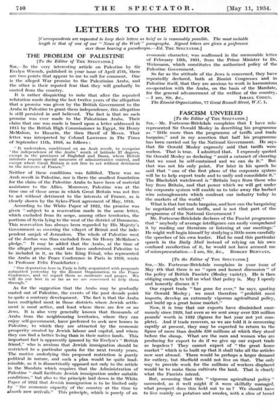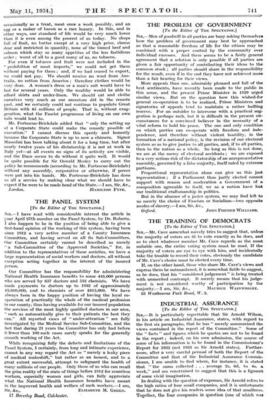May 4th that there is no " open and honest
discussion " of the policy of British Fascists (Mosley variety). He is then obliging enough to tell us what that policy is. May I openly and honestly discuss it ?
Our export trade " has gone for ever," he says, quoting Sir Oswald Mosley ; we must therefore " prohibit most imports, develop an extremely vigorous agricultural policy, and build up a great home market."
Now, it is true that our exports have diminished enor- mously since 1929, but even so we sent away over 350 million pounds' worth in 1932 (figures for last year not yet com- plete). And if trade recovers, as we are told it is recovering rapidly at present, they may be expected to return to the figure of more than double 350 millions at which they stood before the slump. What are the men and women who are producing for export to do if we give up our export trade as hopeless ? They cannot expect of " the great home market " which is to built up that it shall take all the articles now sent abroad. There would be perhaps a larger demand for cutlery, but Sheffield could not live on that. The only way to provide work for the millions of workers displaced would be to make them cultivate the land. That is clearly what the Fascists intend.
But, assuming that this " vigorous agricultural policy " succeeded, as it well might if it were skilfully managed, what prospect does this hold out to us ? We should have to live mainly on potatoes and swedes, with a slice of bread occasionally as a treat, meat once a week possibly, and an egg or a rasher of bacon as a rare luxury. In this, and in other ways, our standard of life would be very much lower than it is even among the poorest of us today. No shops full of fruit, no butter except at a very high price, cheese dear and restricted in quantity, none of the tinned beef and salmon which stay so many appetites of the less fastidious order ; worst of all to a good many of us, no tobacco.
For even if tobacco and fruit were not included in the prohibition of most imports," we could not get them without paying for them ; and, if we had ceased to export, we could not pay. We should receive no wool from Aus- tralia, no cotton from America ; therefore clothes would be very dear. A woman's dress or a man's suit would have to last for several years. Only the wealthy would be able to afford shirts and under-linen. We should eat and clothe ourselves very much as our ancestors did in the remote past, and we certainly could not continue to populate Great Britain with 45 millions of people. That is, without exag- geration, what the Fascist programme of living on our own tails would lead to.
Mr. Fortescue-Brickdale added that " only the setting up of a Corporate State could make the remedy possible of execution." I cannot discuss this openly and honestly because the Corporate State is up to now a chimera. Signor Mussolini has been talking about it for a long time, but after nearly twelve years of his dictatorship it is not at work in Italy yet—at all events no signs of its activity are visible, and the Duce seems to do without it quite well. It would be quite possible for Sir Oswald Mosley to carry out the policy he recommends (according to Mr. Fortescue-Brickdale) without any assembly, corporative or otherwise, if power were put into his hands. Mr. Fortescue-Brickdale has done us all a service by making clear what we should have to expect if he were to be made head of the State.—I am, Sir, &c.,









































 Previous page
Previous page